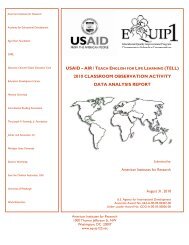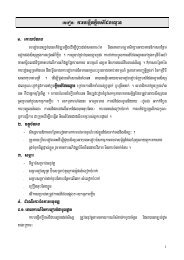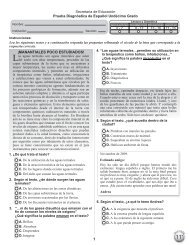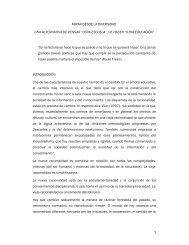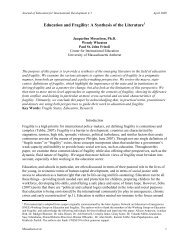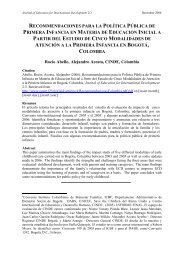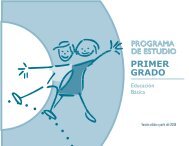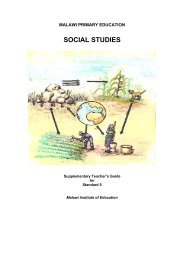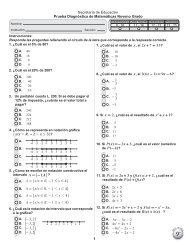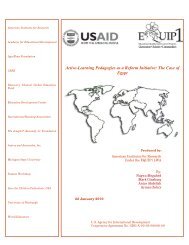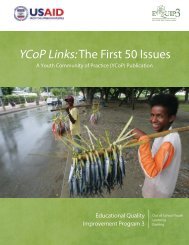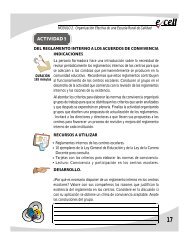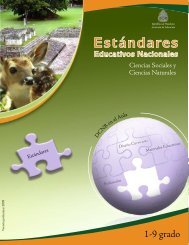The Power of Persistence: Education System ... - EQUIP123.net
The Power of Persistence: Education System ... - EQUIP123.net
The Power of Persistence: Education System ... - EQUIP123.net
You also want an ePaper? Increase the reach of your titles
YUMPU automatically turns print PDFs into web optimized ePapers that Google loves.
Foreword<br />
<strong>The</strong> United States Agency for International Development (USAID)-funded<br />
<strong>Education</strong>al Quality Improvement Program 2 (EQUIP2) is a Leader with<br />
Associates Award that conducts research and disseminates information on<br />
education development with a focus on policy, management, and system<br />
reform strategies to create more effective education programs. <strong>The</strong> project has<br />
addressed such complex topics as abolition <strong>of</strong> school fees, decentralization, costeffectiveness<br />
<strong>of</strong> complementary education systems for hard-to-reach populations,<br />
school effectiveness with an emphasis on efficient use <strong>of</strong> instructional time,<br />
indicators and information systems, secondary school teacher shortages, and<br />
donor effectiveness. EQUIP2 research combines two perspectives: 1) <strong>The</strong><br />
implications for national education policy supporting EFA goals and 2) the<br />
implications for more effective support from donor agencies.<br />
<strong>The</strong> <strong>Power</strong> <strong>of</strong> <strong>Persistence</strong> grew out <strong>of</strong> an on-going series <strong>of</strong> discussions and the<br />
above-mentioned EQUIP2 research about the nature <strong>of</strong> education reform and<br />
the role <strong>of</strong> donor assistance. <strong>The</strong> intent <strong>of</strong> this study was not to replicate the<br />
standard evaluations <strong>of</strong> donor projects, but rather to understand the technical,<br />
institutional, and political dynamics <strong>of</strong> introducing complex changes in education<br />
systems over the long term.<br />
Most education studies focus on either the relative effectiveness <strong>of</strong> technical or<br />
policy strategies (e.g., decentralization, school fees, or teacher training) or on<br />
evaluating whether specific projects or programs have achieved their goals. Some<br />
seek to identify common findings <strong>of</strong> multiple projects, like EQUIP2’s Analysis<br />
<strong>of</strong> USAID Assistance to Basic <strong>Education</strong> in the Developing World, 1990–2005, a<br />
meta-evaluation <strong>of</strong> USAID projects over a 15 year period. <strong>The</strong>se studies contain<br />
important lessons about policy and project design, but <strong>of</strong>ten fail to provide useful<br />
insights into sustainability, institutionalization, and scaling up. However, these<br />
studies <strong>of</strong>ten fail to capture the contextual dynamics <strong>of</strong> culture, history, and<br />
political and institutional forces that shape reform adaptation and sustainability.<br />
Evaluating results through the narrow window <strong>of</strong> activities in a five-year project<br />
inevitably gives a distorted view <strong>of</strong> reality and leaves one with an impression that<br />
most projects are successful, but that education systems neither improve nor<br />
sustain reforms.<br />
viii



